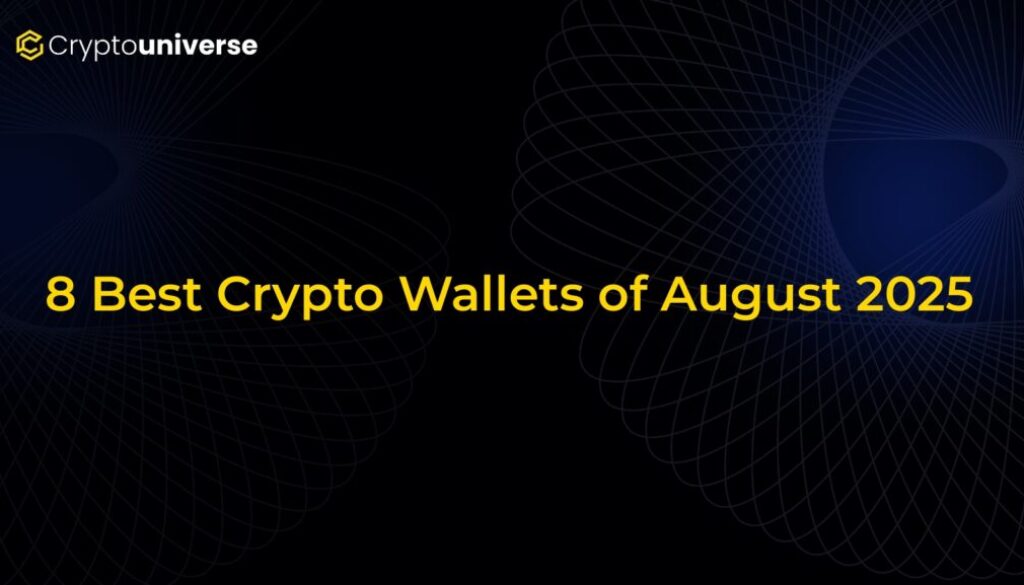8 Best Crypto Wallets of August 2025

Secure Your Digital Fortune: A Guide to the Top Crypto Wallets of 2025
As blockchain technology makes digital assets more accessible than ever, the crypto world is booming. But with this growth comes a darker side: a sharp increase in digital theft and fraud. Choosing the right crypto wallet isn’t just a technical decision—it’s the most crucial step you can take to protect your investments. This guide breaks down the <8 Best Crypto Wallets of August 2025> to help you secure your digital assets, whether you’re a seasoned trader or just starting your Web3 journey.
Many newcomers often confuse crypto wallets with crypto exchanges. If your main goal is to simply buy and sell cryptocurrencies on a platform, you might be looking for an exchange. To understand the difference, check out our guide on the best crypto exchanges.
What Exactly Is a Crypto Wallet?
Contrary to its name, a crypto wallet doesn’t store your coins like a physical wallet stores cash. Instead, it holds the secret digital codes—your private keys—that grant you access to your assets on the blockchain. The blockchain itself is a public digital ledger that records every transaction.
Think of it like an email account. To receive emails, you share your email address (your public key) with others. But to read and send emails, you need your password (your private key). You would never share your password, and the same rule applies to your private key. It’s the ultimate proof of ownership for your crypto.
- Public Key: Generates a public address that you can safely share with others to receive funds. It’s like your bank account number.
- Private Key: A secret code that proves ownership and allows you to sign transactions to send funds. Guard this with your life.
In essence, your wallet is your personal gateway to the blockchain, allowing you to manage, send, and receive digital assets securely.
Hot Wallets vs. Cold Wallets: What’s the Difference?
Crypto wallets fall into two main categories: hot and cold. Understanding the distinction is key to choosing the right one for your needs.
Hot Wallets (Software Wallets)
Hot wallets are software applications connected to the internet, available as desktop, mobile, or browser-based apps. Their constant online connection makes them incredibly convenient for frequent trading, interacting with decentralized applications (dApps), and making quick transactions.
- Pros: Convenient, user-friendly, and often free.
- Cons: More vulnerable to online threats like hacking and malware.
Cold Wallets (Hardware Wallets)
Cold wallets are physical devices, similar to a USB drive, that store your private keys completely offline. This “cold storage” method offers the highest level of security against remote cyberattacks. Transactions are signed on the device itself, ensuring your keys never touch an internet-connected computer.
- Pros: Maximum security against online threats.
- Cons: Less convenient for quick or frequent transactions and come at a cost.
Our Top 8 Crypto Wallets for August 2025
1. Exodus
Best for: Beginners and managing diverse portfolios.
Type: Hot Wallet (Desktop & Mobile)
Exodus stands out for its beautiful, intuitive interface and extensive asset support. It’s a fantastic all-in-one solution for those who want to manage a variety of cryptocurrencies, with a built-in exchange for seamless swapping between thousands of trading pairs. Its strong security features and cross-platform availability make it a reliable choice for any investor.
2. Zengo
Best for: Security-conscious beginners who hate seed phrases.
Type: Hot Wallet (Mobile)
Zengo revolutionizes wallet security by ditching complex seed phrases and private keys. Instead, it uses Multi-Party Computation (MPC) cryptography, a keyless security model that is both highly secure and user-friendly. Combined with 24/7 live support and a slick design, Zengo offers one of the smoothest onboarding experiences in crypto.
3. MetaMask
Best for: DeFi and NFT enthusiasts.
Type: Hot Wallet (Browser Extension & Mobile)
MetaMask is the undisputed king of Web3 wallets. It serves as the primary gateway to the world of decentralized finance (DeFi) and NFTs, integrating with nearly every dApp and marketplace. It offers robust security, customizable transaction settings, and built-in token tracking, making it a favorite for both casual users and advanced DeFi traders.
4. Trust Wallet
Best for: Mobile users needing broad asset support.
Type: Hot Wallet (Mobile)
As a highly versatile mobile wallet, Trust Wallet boasts support for an incredible number of assets and blockchains. It’s an excellent choice for users deeply involved in NFTs and various Web3 projects. Its easy-to-navigate interface and in-app token swapping functionality make managing a diverse portfolio on the go a breeze.
5. Trezor Model One
Best for: A budget-friendly, high-security cold storage solution.
Type: Cold Wallet (Hardware)
The original hardware wallet, the Trezor Model One, remains a top contender for its simplicity and affordability. Released in 2014, it set the standard for offline security. While it may lack the fancy features of newer models, its core function—protecting your private keys offline with hands-on transaction verification—is flawless, making it a perfect entry point into cold storage.
6. Ledger Flex
Best for: Users seeking a premium, feature-rich hardware wallet.
Type: Cold Wallet (Hardware)
The Ledger Flex is a powerhouse of security and usability. It features a large touchscreen for easy navigation and a specialized, tamper-proof chip for storing private keys. Its NFC connectivity allows for seamless interaction with mobile devices, all while keeping your critical data completely isolated from online threats. It’s a top-tier choice for serious investors.
7. Sparrow Wallet
Best for: Bitcoin power users who demand full control.
Type: Hot Wallet (Desktop)
Sparrow is a Bitcoin-only wallet built for those who prioritize control and privacy. It allows users to connect to their own servers, provides a detailed transaction editor that functions like a block explorer, and supports advanced features like the Lightning Network for faster, cheaper payments. This is the wallet for the Bitcoin purist.
8. BlueWallet
Best for: Advanced Bitcoin features on mobile.
Type: Hot Wallet (Mobile)
BlueWallet brings sophisticated Bitcoin functionalities to an intuitive mobile interface. It supports Lightning Network wallets for near-instant transactions, batch transactions to save on fees, and other advanced features typically reserved for desktop clients. It’s the perfect blend of power and convenience for managing Bitcoin on your phone.
Honorable Mentions
These wallets are promising but didn’t quite make our top 8 list for various reasons.
- Best Wallet: A new, anonymous wallet with a sleek interface, built-in portfolio tracking, and early access to token launches. It’s one to watch, but its lack of a long-term track record holds it back for now.
- Coinbase Wallet: Backed by a trusted name, this wallet is great for beginners with its user-friendly design and educational features. However, its close ties to the centralized Coinbase exchange may deter decentralization advocates, and it lacks advanced customization.
- Tangem Wallet: This innovative hardware wallet uses NFC-powered cards, offering incredible durability and a unique security model. Its main drawbacks are limited asset support compared to competitors and a security setup that may not appeal to open-source purists.
How to Choose the Right Crypto Wallet for You
When selecting a wallet, consider these key factors:
- Security: Is it a hot or cold wallet? Does it have a history of security breaches? Look for features like two-factor authentication (2FA), open-source code, and third-party security audits.
- Your Usage: Are you a daily trader or a long-term holder? Traders may prefer the convenience of a hot wallet, while long-term investors should prioritize the security of a cold wallet.
- Supported Assets: Ensure the wallet supports all the cryptocurrencies and tokens you plan to own. Some wallets are Bitcoin-only, while others support thousands of assets across multiple blockchains.
- Ease of Use: A complicated interface can lead to costly mistakes. Choose a wallet with a design you find intuitive and, if you’re a beginner, one with good customer support.
A Final Word on Crypto Risks
Investing in cryptocurrency is exciting, but it’s crucial to acknowledge the risks. The market is notoriously volatile, with prices capable of dramatic swings in short periods. Unlike traditional assets, crypto is largely unregulated and not backed by any government or central bank, making it a speculative investment. Always do your own research, never invest more than you can afford to lose, and prioritize the security of your assets above all else. Your choice of wallet is your first and best line of defense.


